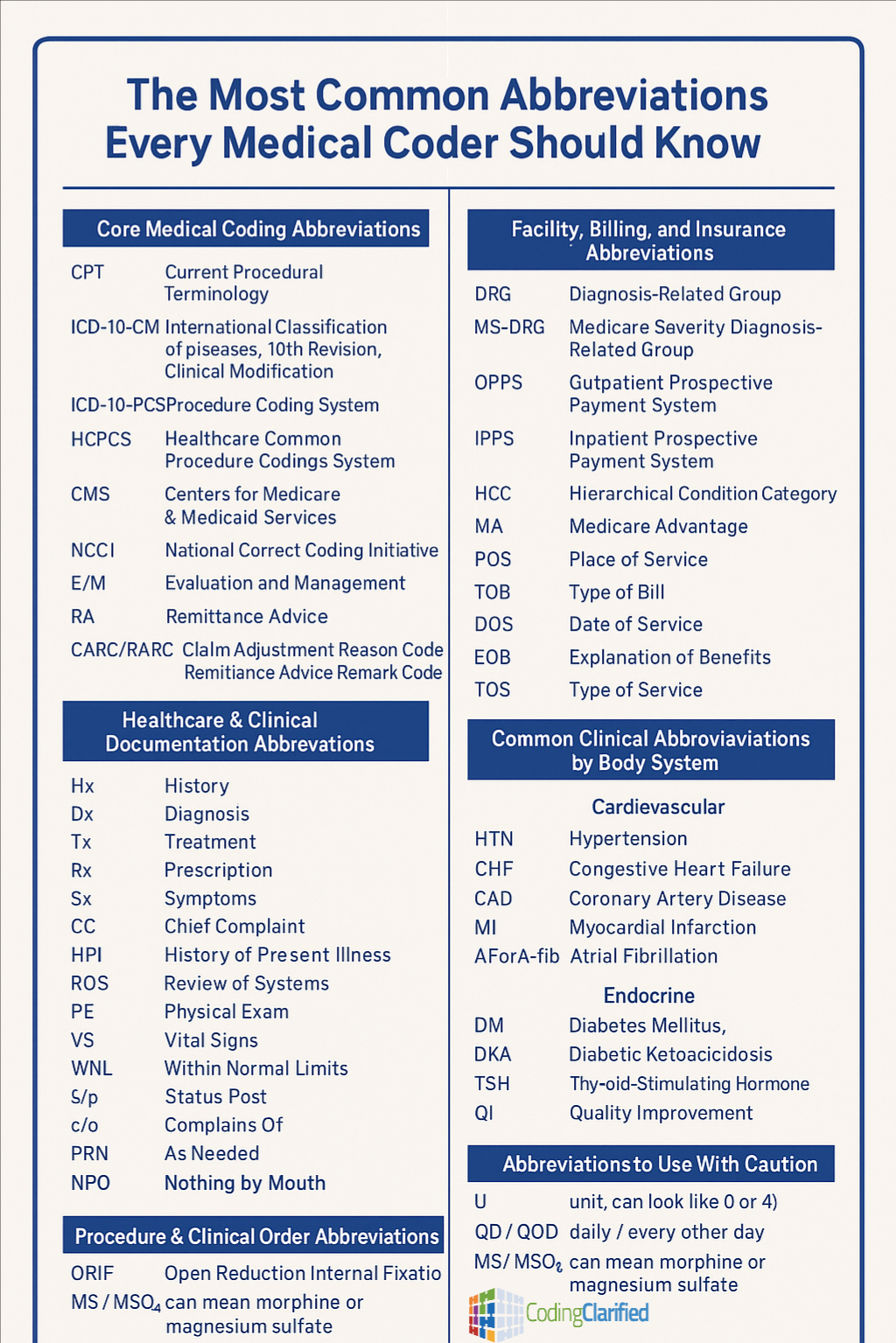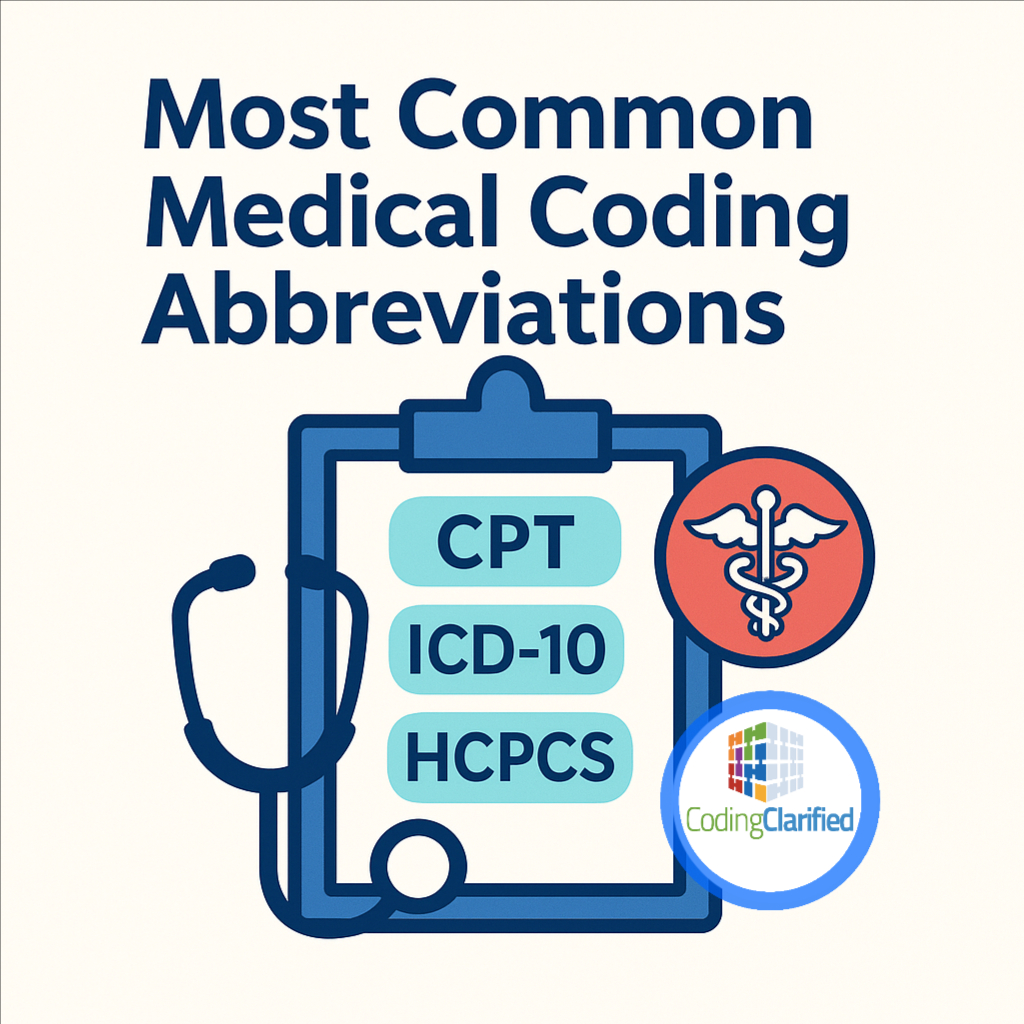The Most Common Abbreviations Every Medical Coder Should Know
Medical coding is a language of its own—and much of that language is built on abbreviations. Whether you’re reviewing provider documentation, preparing for the CPC exam, or coding charts in a live production environment, abbreviations appear everywhere. Understanding medical coding abbreviations quickly and accurately is critical for correct code assignment, clean claim submission, and compliance.
Below is a streamlined guide to the most common abbreviations every medical coder should know, organized by category for easy study and real-world use.
Core Medical Coding Abbreviations
These are foundational abbreviations that appear across coding manuals, payer guidance, and workflow tools.
-
CPT – Current Procedural Terminology
-
ICD-10-CM – International Classification of Diseases, 10th Revision, Clinical Modification
-
ICD-10-PCS – Procedure Coding System (inpatient hospital procedures)
-
HCPCS – Healthcare Common Procedure Coding System
-
CMS – Centers for Medicare & Medicaid Services
-
NCCI – National Correct Coding Initiative
-
E/M – Evaluation and Management
-
RA – Remittance Advice
-
CARC/RARC – Claim Adjustment Reason Code / Remittance Advice Remark Code
Healthcare & Clinical Documentation Abbreviations
Doctors often document using shorthand. Coders must know these to interpret the medical record correctly (and query when needed).
-
Hx – History
-
Dx – Diagnosis
-
Tx – Treatment
-
Rx – Prescription
-
Sx – Symptoms
-
CC – Chief Complaint
-
HPI – History of Present Illness
-
ROS – Review of Systems
-
PE – Physical Exam
-
VS – Vital Signs
-
WNL – Within Normal Limits
-
s/p – Status Post
-
c/o – Complains Of
-
PRN – As Needed
-
NPO – Nothing by Mouth
Facility, Billing, and Insurance Abbreviations
Coders working with claims, Medicare, or facility-side billing will see these daily.
-
DRG – Diagnosis-Related Group
-
MS-DRG – Medicare Severity Diagnosis-Related Group
-
OPPS – Outpatient Prospective Payment System
-
IPPS – Inpatient Prospective Payment System
-
HCC – Hierarchical Condition Category (risk adjustment)
-
MA – Medicare Advantage
-
POS – Place of Service
-
TOB – Type of Bill
-
DOS – Date of Service
-
EOB – Explanation of Benefits
-
TOS – Type of Service
Compliance & Quality Reporting Abbreviations
Coders must understand these to stay compliant with federal and payer rules.
-
OIG – Office of Inspector General
-
HIPAA – Health Insurance Portability and Accountability Act
-
PHI – Protected Health Information
-
MACRA – Medicare Access and CHIP Reauthorization Act
-
MIPS – Merit-Based Incentive Payment System
-
HEDIS – Healthcare Effectiveness Data and Information Set
-
QI – Quality Improvement
Common Clinical Abbreviations by Body System
These appear frequently in provider documentation and can directly impact code selection.
Cardiovascular
-
HTN – Hypertension
-
CHF – Congestive Heart Failure
-
CAD – Coronary Artery Disease
-
MI – Myocardial Infarction
-
AF or A-fib – Atrial Fibrillation
Respiratory
-
COPD – Chronic Obstructive Pulmonary Disease
-
SOB – Shortness of Breath
-
URI – Upper Respiratory Infection
-
ARDS – Acute Respiratory Distress Syndrome
Endocrine
-
DM – Diabetes Mellitus
-
DKA – Diabetic Ketoacidosis
-
TSH – Thyroid-Stimulating Hormone
Neurology
-
CVA – Cerebrovascular Accident (stroke)
-
TIA – Transient Ischemic Attack
-
LOC – Loss of Consciousness
Gastrointestinal
-
GERD – Gastroesophageal Reflux Disease
-
IBS – Irritable Bowel Syndrome
Procedure & Clinical Order Abbreviations
-
ORIF – Open Reduction Internal Fixation
-
CT – Computed Tomography
-
MRI – Magnetic Resonance Imaging
-
US – Ultrasound
-
ECG/EKG – Electrocardiogram
-
CABG – Coronary Artery Bypass Graft
-
LFTs – Liver Function Tests
-
BMP/CMP – Basic Metabolic Panel / Comprehensive Metabolic Panel
Abbreviations to Use With Caution
Some abbreviations are considered “dangerous” or ambiguous. Coders must query the provider if the meaning is unclear.
-
U – “unit” (can look like 0 or 4)
-
QD / QOD – daily / every other day
-
MS / MSO₄ – can mean morphine or magnesium sulfate
Always follow facility policies and the Joint Commission “Do Not Use” abbreviation list.
Why Abbreviation Knowledge Matters
Understanding abbreviations isn’t just helpful—it’s essential for:
-
Faster chart interpretation
-
More accurate code assignment
-
Stronger exam performance (CPC, CCS, etc.)
-
Clean claims and fewer denials
-
Better communication with providers and auditors
Coders who are fluent in medical terminology and abbreviations consistently have higher accuracy and stronger productivity.
Medline Plus Appendix B: Some Common Abbreviations
Understanding Medical Words Tutorial from the National Library of Medicine


